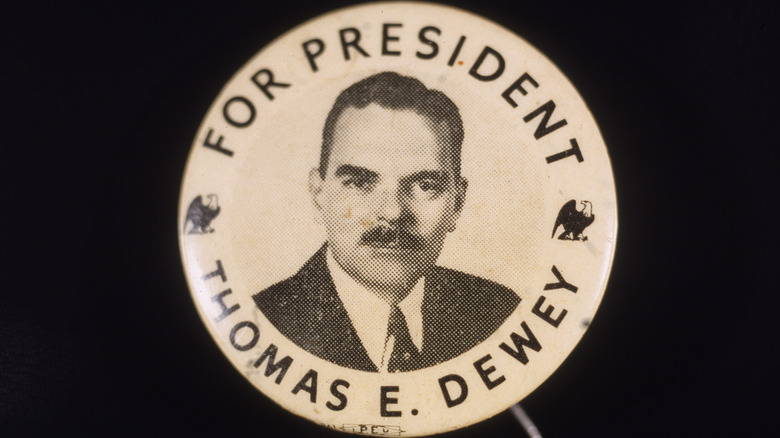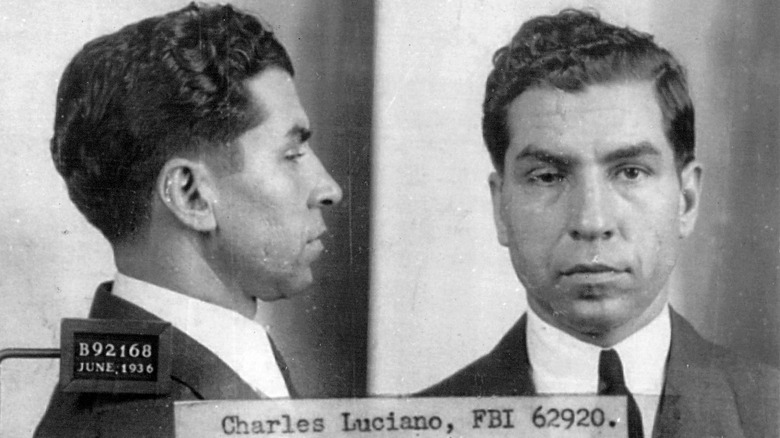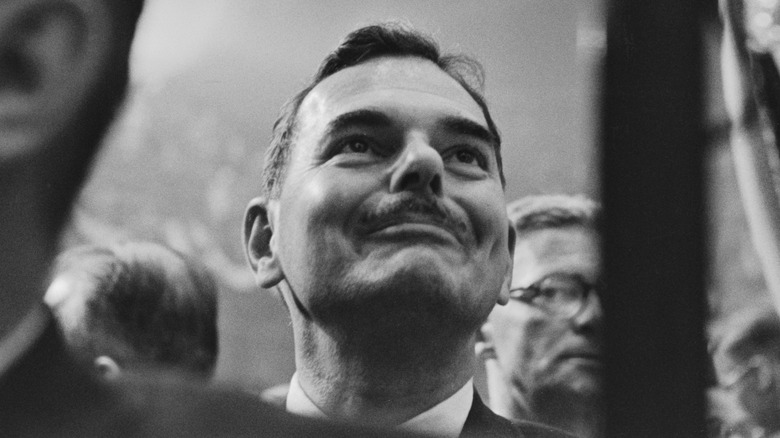Before Thomas Dewey Ran For President, He Locked Up Mobster 'Lucky' Luciano
"We are concerned with those predatory vultures who traffic on a wholesale scale in the bodies of women and mere girls for profit. We are concerned with professional gamblers who run large, crooked gambling places and lotteries at the expense of the public," former New York Governer and 1948 presidential candidate Thomas E. Dewey once declared to the world at large. The grandiose call to arms was made on the night of July 30, 1935, over a radio broadcast. At the time, Dewey was still practicing law as a New York state prosecutor whose principal aim was to take down a sweeping syndicate of mobsters haunting the streets of America like ravenous wolves preying upon helpless lambs. That's how Thomas Dewey saw them, at least (via New York Daily News).
Al Capone was already sequestered in Alcatraz, and following the repeal of Prohibition, mobsters were in hot pursuit of other black markets to sink their serrated teeth into. As a former federal attorney, Dewey was no stranger to swinging the heavy hammer of justice into the skulls of crime kingpins, but the blood trail was starting to lead into more ominous, unfamiliar territories. Nonetheless, he refused to let his stamina falter, and when the canopy of sex work started to envelop the shrouded realm of vice, Dewey set his sights on a fresh series of targets. Charles "Lucky" Luciano, the country's most prominent player in the business of sex work, would become his new pet project (per New York Daily News).
Who was Charles 'Lucky' Luciano?
A $10 million annual income and 5,000 sex workers on his payroll was Charles "Lucky" Luciano's claim to criminal fame. The mob boss, who got his nickname after surviving a savage beating in which his throat was slit, was the most notorious and high-ranking criminal in the country at the time. Thomas Dewey declared Luciano "Public Enemy Number One" after hearing about the mobster's long list of illegal exploits, embarking upon a vigorous manhunt that would end with Lucky not feeling so lucky after all (via Law Library).
Thus commenced a ferocious crusade. With an army of police at his back, Dewey raided brothels and indiscriminately arrested anyone who might have information that he could use against Luciano. Those managing the brothels, their enforcers and foot-soldiers, bookies, and thugs were corralled into interrogation rooms where Dewey and his cop cronies would put the screws to them until they provided him with something useful.
Ultimately, the information he extracted from Luciano's constituents led to Hot Springs, Arkansas, where the mobster was hiding out. Luciano was then brought before a grand jury where he was unanimously found guilty. Convicted on 62 counts related to illegal sex work, Luciano was on his way to the slammer (per Law Library).
Luciano's release and Dewey's subsequent presidential run
According to The New York Daily News, Lucky Luciano sported a sort of boastful cocksuredness while on the stand. As it turned out, his hubris was somewhat warranted in the spectrum of things. In February of 1946, after spending 10 years behind bars, Luciano was released from prison and sent back to Italy after agreeing to help the government protect U.S. ports in the heat of World War II (via The Mob Museum).
In 1942, Thomas E. Dewey was elected governor of New York and would go on to serve three consecutive terms. He ran for president four separate times, and in 1948, he secured the Republican nomination against Democratic candidate Harry S. Truman. By a slender number of votes, Truman, who as vice president had become president upon the death of Franklin Roosevelt in 1945, won the race against Dewey and remained the country's 33rd U.S. president. After Dewey completed his third term as New York's governor, he returned to the private practice of law. He died in 1971 at the age of 68 (per Britannica).


